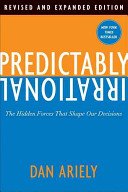Predictably Irrational, Revised by Dan Ariely — Book Review
In a world where we like to think of ourselves as rational beings, making logical decisions based on facts and figures, Dan Ariely’s “Predictably Irrational, Revised” challenges this comforting illusion with a deft touch. Imagine standing in a grocery aisle, brandishing a coupon, and feeling an inexplicable thrill at saving a few cents, despite the fact that you just splurged on an expensive gadget the day before. This book delves into the quirks of human behavior that make such scenarios all too common, offering not just a mirror to our irrationality but a kaleidoscope that reveals its predictability.
The tone of “Predictably Irrational, Revised” is both engaging and accessible, a testament to Ariely’s skill in turning complex behavioral economics into an entertaining narrative. This isn’t a dense academic tome but rather a lively exploration filled with real-world examples and witty anecdotes. The pacing is brisk yet thoughtful, guiding readers through a series of experiments and observations that shed light on why we make the choices we do. The mood is one of curiosity and discovery, perfect for readers who are both intrigued and perhaps a bit skeptical about the inner workings of their own minds. This book is ideal for anyone interested in psychology, economics, and the often humorous intersection of the two.
At its core, “Predictably Irrational, Revised” presents a compelling argument: humans are not the rational creatures we imagine ourselves to be. Ariely builds this case through a series of meticulously crafted experiments that illustrate how our decisions are influenced by seemingly irrelevant factors. Whether it’s the power of free offers, the allure of social norms, or the sway of emotions over logic, the book reveals how these forces shape our everyday decisions in surprising ways. Ariely’s exploration of concepts such as the decoy effect, where the presence of a less attractive option makes another choice more appealing, is particularly eye-opening. He unpacks how these irrational behaviors are not random but follow predictable patterns that can be analyzed and understood.
Connecting these insights to the broader world, Ariely’s work resonates with current discussions about consumer behavior, marketing strategies, and even policy-making. In an age where data drives decisions in business and governance, understanding the predictable nature of our irrationality has profound implications. Consider the recent surge in digital marketing techniques that leverage psychological insights to influence purchasing decisions. Ariely’s exploration of our innate biases provides a framework for understanding these strategies and their effectiveness. Moreover, it prompts reflection on ethical considerations in an era where companies can manipulate consumer behavior with increasing precision.
On a personal level, “Predictably Irrational, Revised” offers more than just insights into human nature—it provides a toolkit for navigating everyday life with a bit more awareness. As I turned the last page, I found myself reevaluating my own decisions, from the small choices of daily routines to larger financial decisions. The book nudged me to question the rationale behind my actions and consider the invisible forces at play. This reflection has been both enlightening and humbling, highlighting the importance of mindfulness in decision-making.
In conclusion, “Predictably Irrational, Revised” is a captivating read that sheds light on the hidden forces shaping our choices. It’s a book that will appeal to anyone curious about why we do what we do, offering valuable insights that are both practical and profound. Whether you’re a student of psychology, a marketer, or simply a curious mind, Ariely’s work will challenge your assumptions and inspire a deeper understanding of human behavior. So, if you’re ready to embark on a journey into the complexities of the human psyche, this book is a worthy companion.

Predictably Irrational, Revised
Author: Dan Ariely
Publisher: Harper
Published: May 11, 2010
Get the book